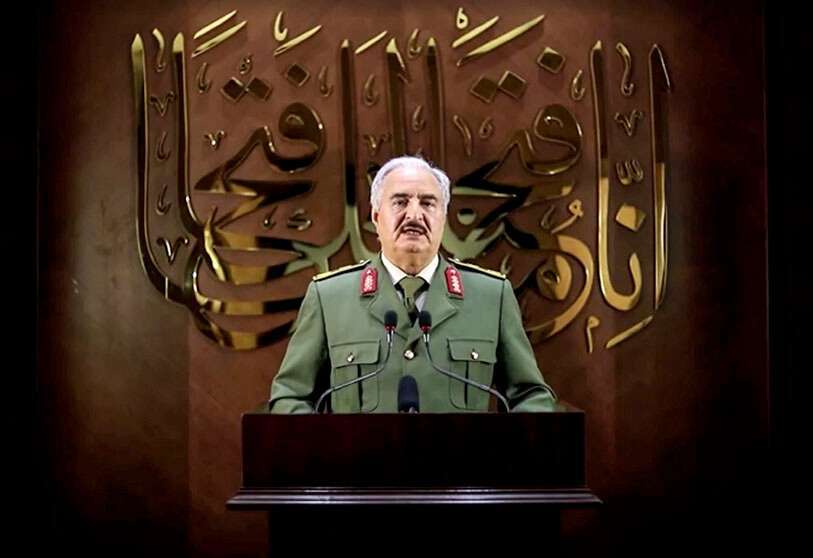Haftar assures the United States that the energy sector in Libya will be resumed

The US Embassy in Libya said that Marshal Khalifa Haftar, leader of the Libyan National Army (LNA), had informed them that power generation in the North African country would be resumed imminently.
This is a major announcement because, for example, oil production at most of the nation's oilfields came to a standstill approximately half a year ago.
"The LNA conveyed to the US government General Haftar's personal commitment to allow the total reopening of the energy sector," the US diplomatic delegation detailed.
The American giant has welcomed this announcement made by the strongman from eastern Libya. Meanwhile, the US ambassador to the African country, Richard Norland, stressed in a letter to Haftar Washington's "confidence" in the Libyan National Petroleum Corporation (NOC) and "support for a financial model that would provide a credible guarantee that oil and gas revenues would be managed transparently and retained for the benefit of the Libyan people".
Oil production in most of the country's fields practically stopped about six months ago. The suspension of production and the closure of oil ports in eastern Libya led to losses of more than 6.5 billion dollars, according to the NOC itself.
The US Embassy in Libya welcomed what appears to be a Libyan consensus to reopen the energy sector, and stated that it is encouraged by an apparent Libyan sovereign agreement to allow the National Petroleum Corporation to resume its important work without political interference.
In a statement, the Embassy noted that Ambassador Richard Norland had recently exchanged letters with Field Marshal Khalifa Haftar and held talks with other Libyan leaders. In these interactions, the Ambassador underlined the confidence of the United States in NOC and its support for a financial model that ensures transparency in the management of oil and gas revenues, which must be passed on to Libyan citizens.

The Embassy confirmed that the US Government was aware of Marshal Haftar's personal commitment to allow the total reopening of the energy sector from this very day onwards. The diplomatic delegation also pointed out that both Fayez Sarraj, prime minister of the government of National Accord (GNA) and rival of the LNA, and the president of the parliament of Tobruk (the other centre of power in the east associated with Haftar), Aguila Saleh, had called for the complete resumption of operations in the energy sector with transparent management of revenues on 21 August.
The US embassy stated that implementation of these commitments is urgent in order to promote the welfare of the Libyan people, who are suffering from an acute electricity crisis linked to the forced closure of oil and gas production, the COVID-19 pandemic and the threat posed to various energy infrastructures by the foreign mercenaries and armed groups present.
He also added that credible statements will allow Libyans to be confident that revenues will not be misappropriated, and pointed out that the reopening of the energy sector will also make it possible to move towards a much-needed revision of the security arrangements for the various facilities. This review would include the complete withdrawal of foreign military personnel and equipment from oil and gas sites, as well as a Libyan agreement to reform the Oil Facilities Guard.
The Embassy also expressed its full support to the Libyan parties as they seek to implement a sovereign Libyan solution for the energy sector rooted in the best interests of the Libyan people. This follows the principle of agreement reached by the parties involved in the Libyan war under the auspices of Morocco in order to put an end to the conflict and reach a solution through dialogue.
All this while continuing to seek a solution to the Libyan civil war that has ravaged the North African country since 2014 and is being waged by the parties that are disputing power after the fall of Muammar al-Qadhafi's regime in 2011. Libya has become an internationalised theatre of war in which different foreign powers with interests on the ground are participating. Haftar's LNA is supported by Saudi Arabia, the United Arab Emirates, Egypt, Russia and France; meanwhile, the LNA receives military support from Turkey and financial support from Qatar, and has been recognised by the United Nations since 2016.
The course of the war was favourable to Haftar's forces following the operation launched on 4 April 2019 on the capital of Tripoli, a bastion of the GNA, but the Turkish intervention changed the course of the war and led the militias associated with Sarraj to gain ground by conquering enclaves such as Sabratha, Sorman and Al-Watiya airport. The Tripolitan government and its Turkish partner even threatened to go after Sirte and Jufra, important centres considered red lines by neighbouring Egypt, whose president, Abdel Fattah al-Sisi, warned of a possible intervention by his powerful army if it was a question of entering these locations.
Turkey has given military support to Sarraj's GNA since the pact signed in November 2019 between the Libyan prime minister and Turkish president Recep Tayyip Erdogan, which ensured Ottoman military assistance to Tripoli's power and distributed exclusive economic zones in the Mediterranean, which are very valuable for their gas and oil resources. An alliance which provoked protests from Greece, Cyprus and the European Union when it was understood that it violated the maritime borders of the Greek islands.
Meanwhile, various sectors have been denouncing the participation of foreign mercenaries on Libyan soil, which further threatens the stability of the area. Russia has the Wagner Group and Turkey, as various media have detailed, has sent paid soldiers from Syria who are allegedly attached to groups linked in the past to Jihadist terrorist organisations such as Daesh and al-Qaeda.








